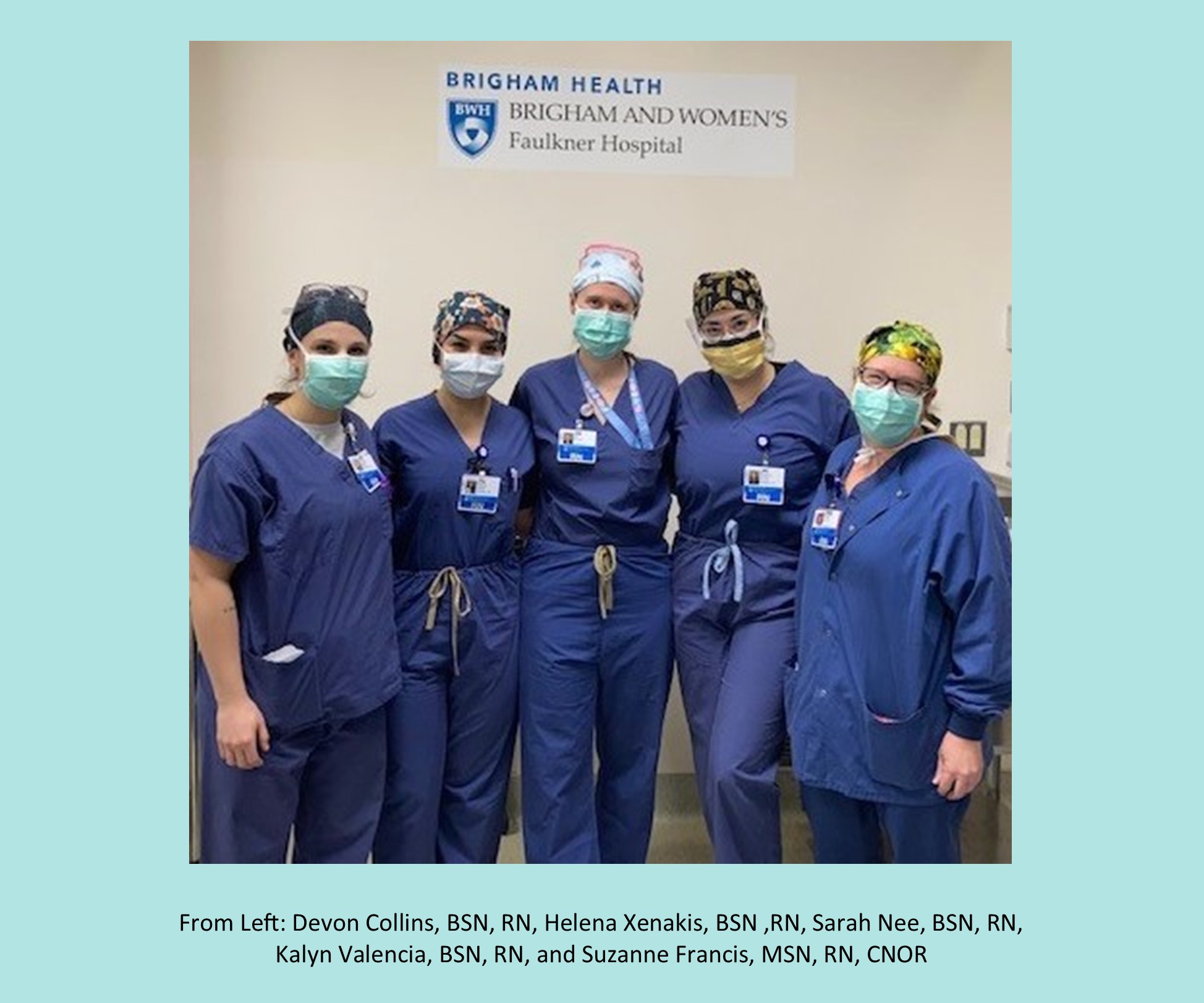
At Brigham and Women’s Faulkner Hospital, Operating Room nurses are highly skilled and committed to advocating for their patients. This year, several registered nurses have taken advantage of a new program offered by the Department of Nursing to learn the ins and outs of the Operating Room that offers comprehensive on-the-job training through the Association of Peri Operative Registered Nurses’ Periop 101 core curriculum.
Shortly after Suzanne Francis, MSN, RN, CNOR, made the decision to transition from a nursing leadership role at another organization and take on a clinical role at BWFH, Operating Room Nurse Director Patrice Baril, MSN, RN, asked her to serve as a preceptor for the Periop 101 program. “The Periop 101 program is great. It’s so different from the way I learned,” she says. “Coming from management, I know all about the struggle to hire and retain OR nurses and I can see how helpful this program is. If we are friendly and welcoming and we train our new nurses the right way at the beginning, we’re so much better off.”
Kristyn Shields, BSN, RN, was one of the first to register for the program. Shields worked in BWFH’s ICU and in the Gregory Endoscopy Centre prior to enrolling in Periop 101. She completed her core curriculum, passed her exam and continues orienting in the OR. “OR nursing is so different from any other type of nursing because your patient is asleep, but I was lucky to be paired with two preceptors with whom I really clicked. So, while everything was all new to me, I was able to navigate the program and I am really glad I did!”
The second cohort of Periop 101 participants, who recently completed their core curriculum and passed their exams, were all hired into the program.
Sarah Nee, BSN, RN, came to BWFH from Spaulding Rehabilitation Hospital. “The OR has always been of interest to me, but I didn’t know how to get my foot in the door. Then I learned about the Periop 101 program,” she says. “I feel like a new nurse all over again, but everyone has been really supportive. It’s been good.”
Kalyn Valencia, BSN, RN, has been learning alongside Nee. She came to BWFH from an endoscopy center where she most recently served as charge nurse. “I had a great experience there, but I wanted to be more involved with the procedural side,” she says. “I’ve been interested in OR nursing since nursing school, but I didn’t know how to get started. This program is really great because it guides you through the learning process.”
Also in the second cohort of nurses in the Periop 101 program are Mollie Cullinan, BSN, RN, and Gabrielle Harris, BSN, RN.
A third group of nurses, also hired into the program, recently began their core curriculum.
Helena Xenakis, BSN, RN, who has a background in psychiatric nursing and the PACU became interested in the OR while working at an outpatient surgery center. “It’s been a great transition. I’ve learned a lot in just a couple of weeks and already my brain is full with new knowledge,” she says of her experience thus far in the Periop 101 program at BWFH.
Devon Collins, BSN, RN, became interested in a career in the OR after her sister completed the Periop 101 program at another organization. “She encouraged me to explore the field. It seemed interesting so I applied to the Periop 101 program,” she says. In an interesting twist of fate, her sister recently accepted a role with the OR team at BWFH.
Baril says the opportunity to provide on-the-job training to nurses interested in working in the OR has been invaluable as hospitals across the country are challenged with nursing shortages. It’s been a particular challenge because of the nuances of OR nurses. “The biggest part of our job is advocating for our patients,” she explains. “The role of the nurse in the OR is to look at the whole patient and the whole room and speak up for our patients.”
Francis agrees, but says the challenge is what makes her career so rewarding. “I love being there for patients at their most vulnerable time,” she says. “I hold their hand when they go to sleep and when they wake up. They might not remember me, but I know that I was there for them.”
Looking for more news from BWFH? Go to News to find articles about health, updates to our programs and services and stories about staff and patients.
Go to News